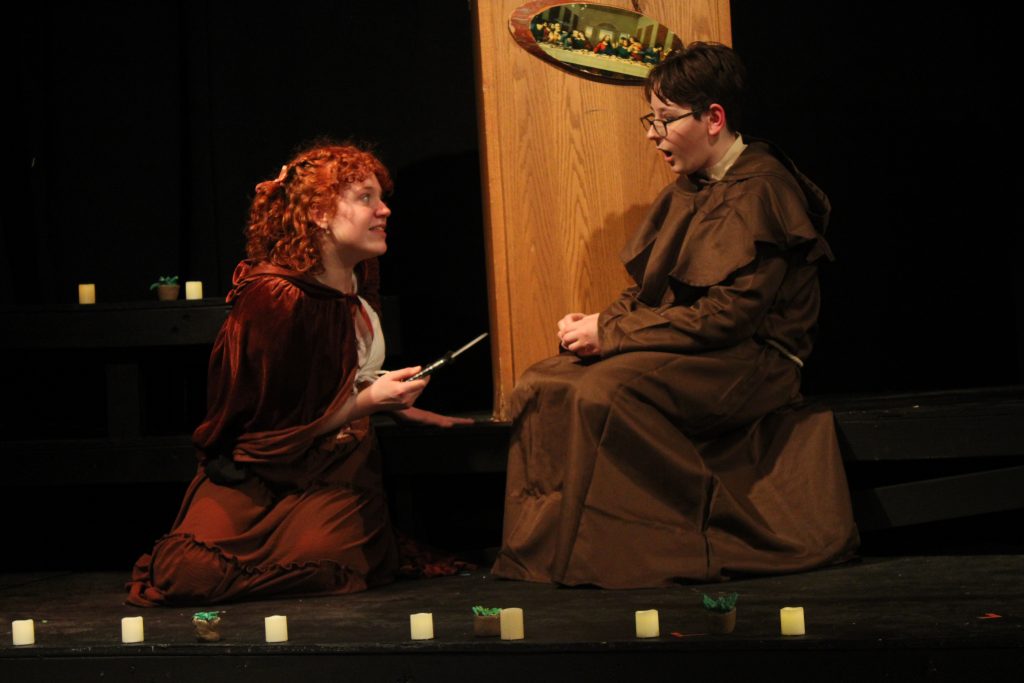The Hinman Production Company presented a rendition of “Romeo and Juliet” this past weekend. Zoe Steinberg, the director and the company’s president, put a twist on the classic play by gender-bending Romeo and making the love story between two women.
While the show was produced using Shakespeare’s writing and production, changes were made to highlight queer voices. Steinberg, a junior majoring in English, shared how she transformed the classic into a lesbian romance.
“There was so much prep that went into place to do this show,” Steinberg said. “I went through the script myself and literally, myself, typed the entire thing out of my Arden edition of Shakespeare because I wanted to make sure that every single reference that was made, every single joke — Shakespeare is very witty — it all had to make sense to me before it could make sense to anyone else because they’re not doing the hours and hours of work that I was doing to understand what was going on. So that was just very time-consuming.”
Steinberg explained that the concept of casting two women as Romeo and Juliet came to her as a freshman and that it’s been something she’s wanted to direct ever since. At first, she thought that it would be cool to play Romeo herself, but her idea grew the longer she was a part of Hinman Production Company.
Throughout the production, the changing of Romeo’s gender was seamless. It was interesting to see some of the changing dynamics that were found with the swap. From Romeo’s friendships with Benvolio and Mercutio to Juliet’s arranged marriage to Paris, the change made the audience view the messages of the show differently.
Elaina Pecora, a sophomore majoring in English who starred as Juliet, explained how the twist helps to normalize queer love stories.
“Just the basic idea of not making the entire thing circle around the fact of they’re both girls, they’re lesbians,” Pecora said. “It is a story about overcoming and making your love work out, but it’s not because of the fact that they’re gay or queer. It’s just something that’s accepted and something that is already established and something set in the world of it all.”
The costuming of the show aided the audience by demonstrating the differences between the Capulets and the Montagues. Each family was easily identified through colored ribbons in their hair and clothing — red for Capulet and blue for Montague. With the many characters in the show and some cast members changing characters, the ribbons made it easy for the audience to differentiate.
In addition to the decision made with the ribbons, the costuming and set design of the show brought Verona to the stage. Steinberg chose to set the show in England’s regency era, a decision she made mostly so that Paris could pull a gun but also as a way to put another spin on the classic play.
Along with the changes in the story, the cast did a great job of portraying the different relationships and dynamics of the show. Lily Thorne, a junior majoring in computer science who played Romeo, shared how she and her costar created the chemistry needed to play the iconic love interests.
“Elaina, who plays Juliet, is just awesome,” Thorne said. “At the callback, I immediately was like, ‘Oh, she’s so easy to work with.’ It’s really just been getting closer and a lot more comfortable with each other. This story is just so raw and deep, and it’s kind of crazy because no one is falling in love in one single second. It was interesting to play on that dynamic of immediately you’re just in awe and in love, but I do think Elaina helped make it really easy.”
The importance of social interactions was also seen in many other characters of the show. Another change that was made for the production came in the form of Mercutio. In this rendition, Steinberg added a moment for the character where he kisses Tybalt during their fight scene. Mercutio is often a character that is suggested as queer in many productions of the show, but the Hinman Production Company brought the suggestive language to the forefront by having Mercutio make a move.
Ian Moszynski, who played Mercutio and is a junior majoring in English who played Mercutio, described what it meant to play an openly queer version of the character.
“I feel like he’s really queer-coded already,” Moszynski said. “Just with a lot of his lines and he’s often kind of played that way. I think more so I see him as kind of having something going on about how he feels about Romeo rather than Tybalt, but really, in some ways, it’s not that different. It’s just kind of amplifying those parts where you can read between the lines, especially in the exchange he has with Tybalt, which is very homoerotic. Every line is like, ‘Woah Shakespeare, did you know what you were talking about?’ Yes, I think he did.”



